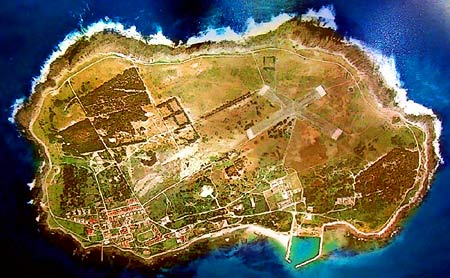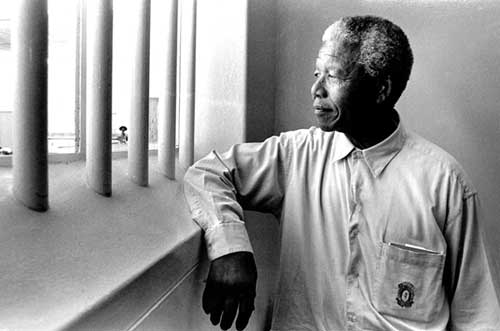
Robben Island is located about 12 kilometers from Cape Town, South Africa and is reached by ferry from the Victoria and Albert Waterfront. Since 1997, it has become one of the most popular tourist destinations in all of Cape Town and was declared a World Heritage Site in 1999. But for nearly 400 years, Robben Island was a place of banishment, exile, isolation and imprisonment. It was here that rulers sent those they regarded as political troublemakers, social outcasts and the unwanted of society. It was here that Nelson Mandela spent 27 years languishing in prison as a political prisoner during Aparteid.
During the apartheid years Robben Island became internationally known for its institutional brutality. The duty of those who ran the Island and its prison was to isolate opponents of apartheid and to crush their morale. Some freedom fighters, like Mandela, spent more than a quarter of a century in prison for their beliefs performing backbreaking labor in the oppressive African heat.
Overcoming opposition from the prison authorities, prisoners on the Island after the 1960s were able to organise sporting events, political debates and educational programmes, and to assert their right to be treated as human beings, with dignity and equality. They were able to help the country establish the foundations of a modern democracy.
Those wrongfully imprisoned on the Island succeeded on a psychological and political level in turning a prison ‘hell-hole’ into a symbol of freedom and personal liberation. Robben Island came to symbolise, not only for South Africa and the African continent, but also for the entire world, the triumph of the human spirit over enormous hardship and adversity.
Today, Robben island offers amazing tours given by former political prisoners who served many years on the island. All of these political prisoners have had close ties with Nelson Mandela himself and recall their experiences. It is truly moving to hear their stories and to see the conditions in which they lived for decades. Seeing Mandela’s cell and the accompanying work quarries where they all had to perform years of hard labor was quite moving. It is sad because it reminds you that it was just fifteen years ago that Aparteid still reigned in South Africa and these generally innocent people lost decades of their lives for it.
These are just some reasons why Nelson Mandela is so highly regarded around the world. His vision and political influence has led South Africa from its darkest hours to prominence on a global scale. South Africa was awarded the 2010 World Cup soccer tournament because of Nelson Mandela and as a result of the government continuing work to integrate cultures within such a diverse country.
Mandela has recalled his time on Robben Island in many ways but when he revisted the island where he was held captive for 27 years and saw how many tourists flock to his island of horrors and take pictures in his cell, he sees himself as more than just a man. He is a symbol of his country to his people and a symbol of Africa in general to the rest of the world. His influence and global respect is astounding and I felt such a sense of pride and history having visited his cell and seeing what he went through. Knowing his story and that of the many other political prisoners from Robben Island is great but to actually see the cells and the prison is something I will never forget.













Robben Island is an amazing place to visit and seeing the actual cells is an experience I will never forget.
Robben Island is a testament to Mandelas greatness and the evils of aparteid in our checkered past.